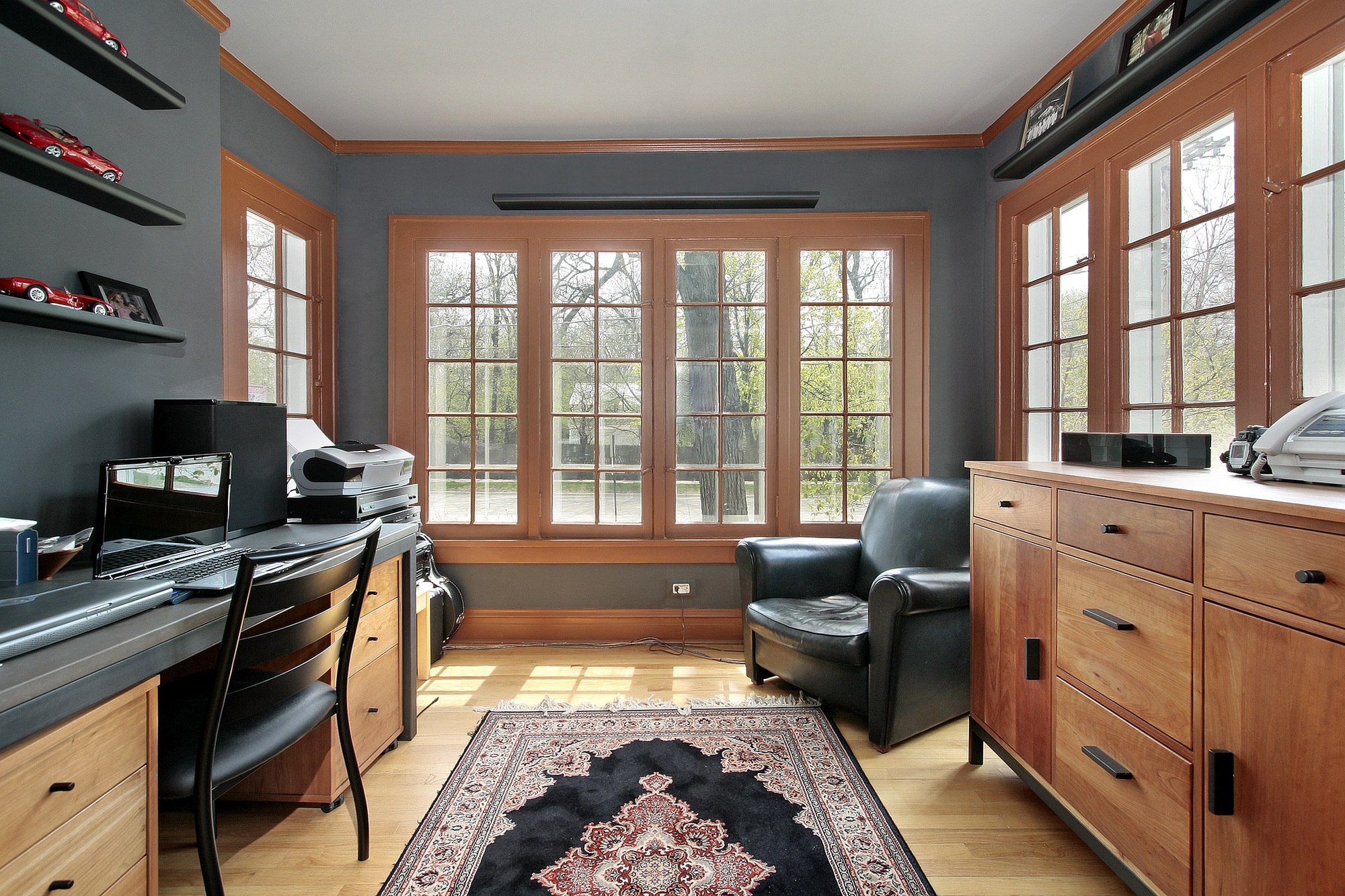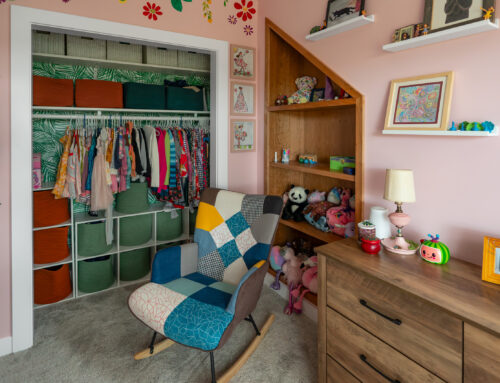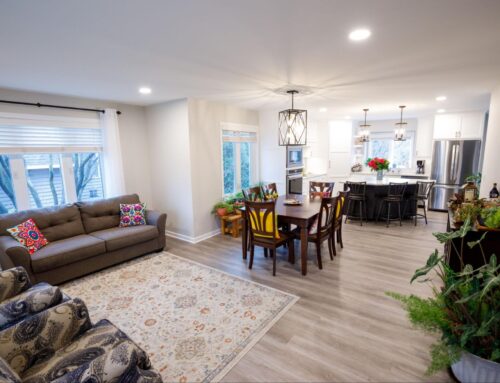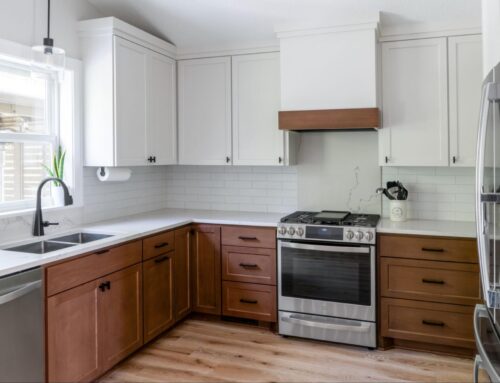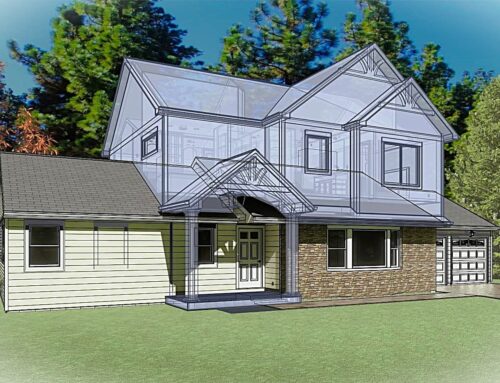Say goodbye to survival mode and create a home office where you can thrive.
Working remotely, what we hoped would be a quick blip in time, has instead become a new normal. And it looks like working from home is here to stay for the long haul. In fact, Global Workplace Analytics estimates that at least 56% of the U.S. workforce can do their job remotely and that by the end of 2021, nearly a third of U.S. workers will work from home for at least part of the week.
So today, we’re sharing tips to bring your work-from-home office design dreams to life. We explain how to design a home office that’s organized, functional, and comfortable. After all, you spend a lot of time here! Let’s make it enjoyable.
Questions To Ask Before You Set Up a Home Office
When you begin any home remodel or room refresh, it’s important to get clear on exactly what you need from the space. For Steph Morris, interior designer at Titus Contracting in Burnsville, MN, it all comes down to asking the right questions. So, ask yourself these questions to decide what you really need from your home office:
- Is privacy/quiet important? Do you spend a lot of time on calls? Do you need a well-designed spot for video conferencing?
- Is it a shared office space? Does your partner work from home, too? If you have children, do you want space for them to work as well, or will this be a kid-free zone?
- What’s your working style? Do you rely on digital calendars and scheduling apps or do you need space to hang memo boards and calendars?
- What equipment do you need to do your job from home? Just a laptop and a place to charge it? Do you rely on a printer, fax machine, or an extra monitor?
- Be honest: What does your desk surface typically look like? Do you need space to spread out papers and keep things at hand, or are you more of a minimalist? What storage solutions would help keep your home office organized?
Now that you’ve got a better idea of what you need from a home office, the next question is where it should go.
Where To Put Your Home Office
If you mostly rely on a laptop, there are lots of places to squeeze in a workspace at home. An underused corner of a bedroom or living room can make a great home office with little more than a desk and a few accessories. Even a kitchen or dining room table can get the job done. Just make sure you have a bin or nearby drawer to stash chargers and stray papers when you’re not working.
If you need a full home office, consider your home’s layout to find the right spot. Do you have a guest room that’s lying empty? Is there unfinished space in the attic or basement that you could remodel to add a home office? Steph and the team at Titus have helped clients transform unused formal living and dining rooms into private home offices by simply adding some french doors to close it in.
Don’t Forget About Home Office Lighting
It’s also important to consider lighting when deciding where to put your home office. Especially natural lighting. In a study conducted by the workforce productivity experts at Leesman, more than 75% of the quarter of a million workers surveyed said that natural light is important to them. But this isn’t just a wish list item. We thrive in workspaces with natural light.
Researchers at the University of Chicago’s Interdepartmental Neuroscience program found a strong correlation between daylight exposure and sleep patterns, activity levels, and overall quality of life. In fact, people with adequate exposure to daylight got an average of 46 more minutes of sleep per night than those who worked in a windowless environment. That’s almost an extra full night’s sleep each week!
Plus, access to natural light allows you to keep plants in your office, which can boost focus and creativity — even overall air quality. So, as you’re designing a home office, don’t overlook the importance of natural light in your workspace.
How to Design a Home Office
Now that you’ve picked the perfect spot to work from home, how do you set up a functional home office? There’s a lot to consider, from seating and desk options to personalizing the space and choosing the right accessories.
Work from Home Office Furniture Ideas to Consider
There are a lot of options for home office furniture. With every design choice she makes, Morris likes to consider the “3 Fs” — form, function, and feel. This applies from furnishing to decorative elements. For example:
- Finding the right desk — Do you want the option to stand? You might love the look of a sleek, modern desk with tapered legs, but does it really provide the storage you need? Always double-check measurements, especially if you’re shorter or taller than average, to make sure you’ll be comfortable with the height.
- Choosing an office chair — Do you prefer a traditional office chair with wheels? Will your flooring allow it to roll easily? Does the chair height actually pair well with the height of the desk you’ve selected? (Even an inch or two can make a huge difference when you’re sitting there all day.)
- Home office storage and organization — Is this home office for working remotely or does it also need to serve as a family command center, corralling mail and housing important documents? Is this also serving as a homeschooling spot for distance learning?
When furnishing your home office, don’t just purchase based on a pretty picture. Take the time to find pieces that offer the look, comfort, and functionality you need.
Home Office Organization Tips
When it comes to organizing your home office, there are endless options. It typically comes down to understanding your needs, habits, and personal style.
If clutter makes you crazy, devise a system to keep things where they belong and avoid piles. Stackable bins can corral papers and drawer organizers keep everything within reach.
Don’t forget about bookshelves. Even if you don’t have tons of books to display, they can be customized with doors to provide storage below while displaying beloved objects and artwork above. Decorative bins and baskets on the shelves can hold office supplies if your desk lacks adequate drawer space. You can even have custom built-ins designed to include file drawers for added paper storage.
Why It’s Important to Decorate Your Home Office
It’s easy to view a home office as strictly utilitarian. But it’s important to create a workspace that’s both functional and beautiful. “Make your home office a place you want to be! You want a space that has wellness to it, that has a culture that makes you want to be there,” says Stephanie.
And this isn’t just a designer’s opinion (though they do create amazing home offices of their own). Everything about the design of a space can affect our productivity and mood, from color choice to lighting to clutter. A well-designed workspace can reduce anxiety, something we could all use right now.
So take the time to choose a feature or two that will turn your home office into a retreat. “Is it a quick paint job, is it some art? Make it purposeful so that when you’re in there you don’t see a bunch of boxes or totes and it feels like a to-do list that aggravates your thoughts and you can’t focus,” Morris explains.
But should you invest in a home office remodel?
Despite the air of uncertainty, home improvement projects continue across the U.S. In fact, a LightStream study found that 73% of homeowners plan to upgrade their homes in 2020. And, as work from home trends continue, a designated home office is sure to be on prospective homebuyers’ wish lists. So if you’ve been looking to add a home office, now is the perfect time to add lasting value to your home.
From reconfiguring your current layout to designing the perfect built-ins, our home remodel experts at Titus are here to help you upgrade your home office. Contact us today to design the perfect place to work from home! 952-746-7817

